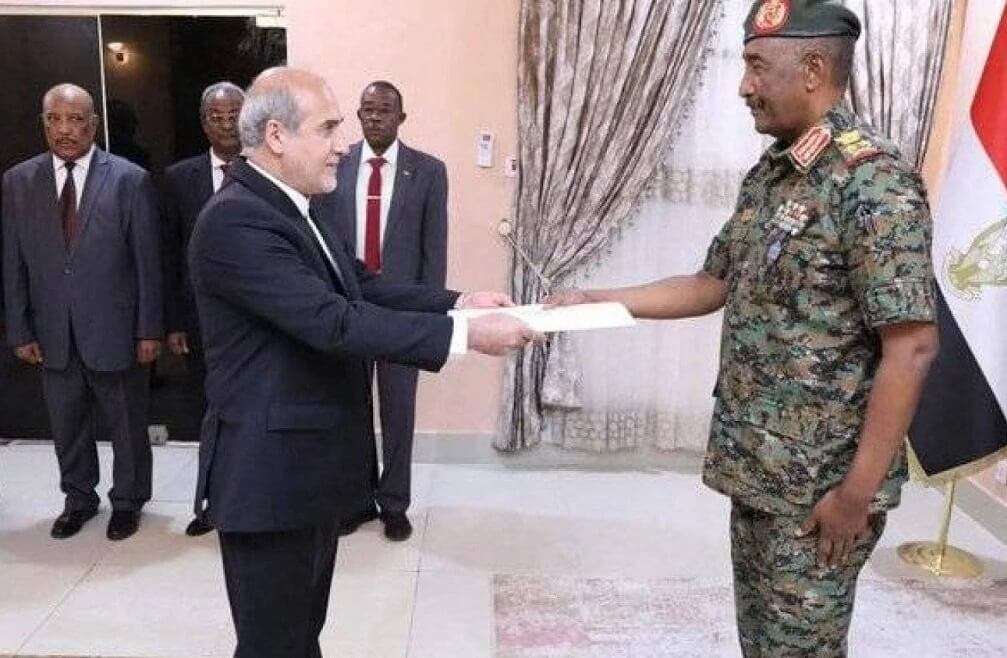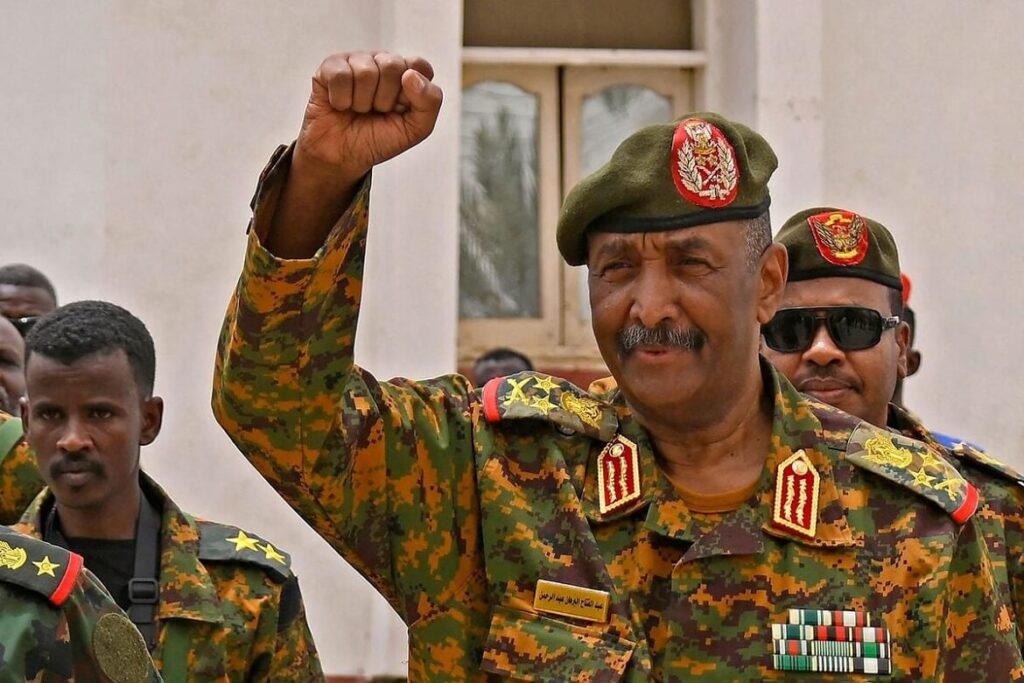World Geostrategic Insights interview with Hazem Salem Al Dmour on Iran’s increasing security and military involvement in Sudan, and risks that it poses to Sudan’s stability and regional security in the Middle East and Africa.

Hazem Salem Al Dmour is a Specialized Researcher in International Relations and Strategic Studies, General Manager at the Amman-based Think Tank STRATEGIECS – ستراتيجيكس
Q1 – You recently traveled to Sudan and collected first-hand accounts from well-informed people about the growing Iranian influence in the country. Your work resulted in a long documentary published on the website of the Think Tank STRATEGIECS. Can you summarize here how Iran is tightening its control on Sudan, according to your sources?
A1 – Iranian-Sudanese relations were consolidated with the military coup that brought the Islamic Front to power in Sudan in 1989, a period he witnessed firsthand. As for security and intelligence relations between Iran and Sudan, they began in the early 1990s under the leadership of General Mahdi Ibrahim, founder of the Sudanese security system along with Dr. Nafie Ali Nafie. Iran played a key role in shaping Sudan’s security and intelligence system by training and supplying weapons to the Sudanese army.
To further consolidate its influence on Sudanese society and religious life, Iran established Husseiniyahs (Shiite mosques) in Sudan, which served as a gateway for the spread of Shiite Islam both domestically and in Africa. All this took place under the auspices of the Iranian Cultural Center, which established 45 branches and schools, such as the Al-Furqan Schools, which are still operational.
Officially, relations between the two countries ended on January 4, 2016, when Sudan severed diplomatic relations with Iran due to its interventions in the region and attacks on the Saudi embassy and consulate in Tehran.
However, Khartoum’s official severing of relations in 2016 did not have a significant impact on Tehran’s security, military, and economic influence on Sudan. Military and security ties continued through the National Intelligence and Security Service (NISS), through a front organization called the Afro-Arab Union for Digital Media. This arrangement continued until the fall of Bashir’s government in April 2019, when the union was dissolved and relations were severed, only to be restored in 2020 under the supervision of Sudanese military intelligence.
After the revolution in Sudan in December 2018 and the ousting of al-Bashir as president in January 2019, military intelligence and military security resumed the communication file with the Iranians. Direct supervision of relations on the Iranian side was given to Qasem Soleimani until his assassination in January 2020. Thereafter, supervision was assumed by Brigadier General Esmail Qaani.
The armed conflict between the Sudanese army and the Rapid Support Forces, along with the Gaza war, provided Tehran with an opportunity to make Sudan a new platform for attacks against American, Israeli and Arab interests. The conflict which escalated into a civil war, reshuffled alliances within the country. It has brought Islamists back into high positions, and their influence has grown significantly as the war has continued. They fought alongside the Sudanese army against the Rapid Support Forces, particularly the Brotherhood Brigades affiliated with the Sudanese Islamic Movement, locally known as Kizan. This has largely contributed to the failure of all international and regional efforts to initiate dialogue and propose solutions to the civil war, whether through the Jeddah talks, the IGAD initiative or the Egypt Conference.
Islamists are aligned with Iran as a state and ideology, seeking to strengthen Tehran’s power, protect its interests and expand its influence. They have strong relations with other Islamist organizations in the region, such as Hamas, al Qaeda, Hezbollah and the Houthi movement. These relations deepened and intertwined after the Gaza war and the assassination of Hamas political leader Palestinian Ismail Haniyeh in Tehran on July 31, as well as after the series of Israeli military attacks in Lebanon.
Q2 – What implications might Iran’s growing influence over Sudan have?
A2 – To understand the implications of Iranian power in Sudan, one must first examine the broader current landscape in Africa. The continent is undergoing rapid transformations, with increasing challenges to U.S. capabilities to combat rising terrorism. These challenges have been exacerbated by four post-2020 coups in the African nations of Guinea, Mali, Burkina Faso, and Niger. Since the July 2024 withdrawal of U.S. forces from the air base in Niger designated for counterterrorism, central Africa has become a quagmire in which local governments struggle against terrorist organizations such as ISIS and al-Qaeda, as well as sympathizers seeking to wreak havoc.
Iran possesses the expertise, knowledge, and history of organizing, structuring, and supporting jihadist militants through various means. Strengthening its influence in Sudan amid growing uncertainty and ambiguity would allow Iran to redevelop its infrastructure, enabling it to direct and organize these organizations and groups. This is particularly likely if the Sudanese army succumbs to external pressures and transforms from a national institution into a body comprising various militant groups akin to the Popular Mobilization Forces in Iraq, effectively becoming a proxy for Tehran. In such a scenario, Sudan could revert to being a rogue state that threatens regional stability.
Iran’s control of Sudan may have serious and long-term repercussions on the security and economic interests of the United States and its Arab partner countries, particularly Egypt and Saudi Arabia. Iran’s control transforms Sudan into an active and influential state regarding the fate of a vital trade corridor for Saudi Arabia, Egypt, Jordan, and Israel.
The negative impacts of Iran’s presence are evident in the recent military activities of the Houthis, who now have a pathway for weapon smuggling, leadership transfer, advanced technology, and espionage equipment, forming a new terrorist nexus that will be difficult to dismantle. Moreover, the geographic depth of the Iranians and the Houthis increases. Given that Sudan is the gateway to Africa, Iranian influence will continue to expand there.
Specifically, Iranian influence in Sudan poses a serious risk to Saudi Arabia, and this may be Iran’s ultimate goal.

Q3 – What repercussions might it have in the Red Sea?
A3 – The expansion of Iranian influence in Sudan increases pressure on the country’s armed forces and weakens the country’s position against the establishment of an Iranian naval base, especially given the intensity of the civil war, which increases the army’s need for Iranian support. This would put the Iranian Revolutionary Guard just under 320 kilometers from the Saudi coast. In addition, the presence of an Iranian naval base would strengthen Iran’s intelligence and reconnaissance capabilities in one of the world’s busiest sea corridors. It could put the Red Sea at the mercy of Iranian-backed terrorist groups.
Indeed, Iran continues to try to influence the dynamics of the Red Sea, both by influencing the Bab al-Mandeb Strait and by establishing a foothold along its shores, that represents an existential threat to energy supplies and facilities.
The Houthis have obtained support and assistance from Iran, particularly in the use of missile arsenals and drones against military and commercial vessels and Israeli targets. In addition, Iranian and Houthi activities in the Red Sea have repercussions beyond trade and energy security. There are real concerns about threats to the global digital infrastructure, with undersea cables that could become targets of Iran and its agents. The Red Sea seabed hosts 16 fiber optic lines, which together account for 17 percent of all international data transmission lines.
Houthi control extends to the Bab al-Mandeb Strait, which is one of three choke points for cables from around the world, connecting Europe, India, and East Asia. Contrary to erroneous assumptions that they do not have the technical and military capabilities to damage submarine cables, the Houthis have demonstrated considerable warfare skills.
The full report can be read here Sudan: The Country Hijacked by Islamists and Targeted for Burial by Iran.
Hazem Salem Al Dmour – General Manager at the Amman-based Think Tank STRATEGIECS – ستراتيجيكس.







